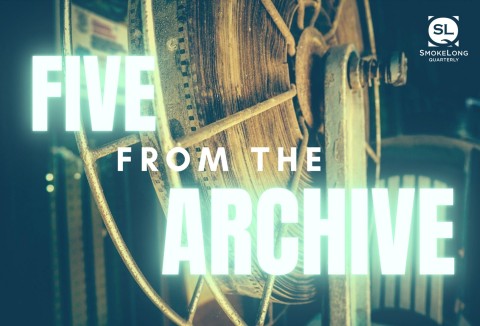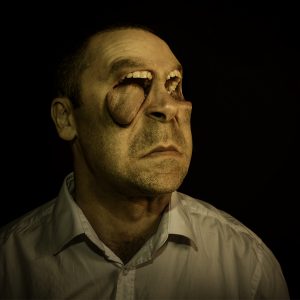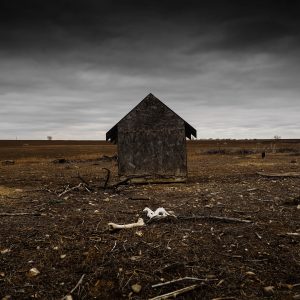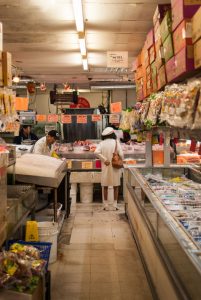
The following is part of SmokeLong‘s series Five from the Archive, which fulfills a need for teaching resources in the flash-narrative community and beyond. In this installment, Sherrie Flick takes a look at five stories in the SmokeLong story archive that use food as a narrative element.
__________________________________
by Sherrie Flick
The beauty of food is that we all eat. We’re all hungry and full and late for dinner and skipping breakfast and hiding the chocolate. Food is connected to emotions too, like desire and lust and temptation. Greed. You get the idea. Using food in flash fiction can help you quickly bring your reader to the table—or repulse them depending on what’s for dinner. Cannibalism is a cultural taboo, for instance. A lot of people find eating live bugs weird. It just depends on the context.
I use food in my own writing a lot, because I cook and bake and garden and eat. A story I published in SmokeLong many years before I became an editor here is one example “Shadows” was written in response to a black-and-white photograph by Luke Swank. In the photo a stack of butternut squash sits on a stand at an outdoor market. They’re a little lusty, these squash. I used the photo to evoke a grocery trip between a couple whose desire has cooled. Franci thinks about time and desire and “butternuts—sexy at the waist” as she shops for dinner.
Food helps us evoke all the senses sight, sound, taste, and touch. It can bring us closer to ourselves and bring readers closer to our stories.
These five selections from SmokeLong’s archives showcase a variety of ways to effectively use food in flash.

1. Food as Object
“Hatched” by Nicole Rivas
Nicole Rivas writes about an unlikely potluck date. There’s so much to love in this story, but one of my favorite things is the “wooden bowl covered in plastic cling wrap” that we meet in sentence number 5. It does a great job of characterizing Lily. Food as object is a way to help with setting and characterization.
Writing Prompt: Revise a piece of flash by adding food to serve as an object to establish setting and also help characterize a person holding or eating the food.

2. Food as Concept
“Hunger” by Lucas Southworth
In Lucas Southworth’s evocative “Hunger,” we have the thrum of hunger driving the story forward. But it isn’t the hunger of a single person, instead it’s the hunger of cities within cities. Food is conceptual here. We are called out on our desire and on our thirst to satisfy ourselves in the face of decay.
Writing Prompt: Think of the concept of hunger or hungering. Use it as the driving force or extended metaphor in a piece of flash fiction.
“Sweet-N-Low” by Pingmei Lan
Pingmei Lan ties sexual assault and forced assimilation to a Sweet-n-Low packet and Peking duck in this piece of flash. The alienation of place is so well done here. Food and sex are so often paired, because that primal connection to hunger and all the lusty visual connections of food to body parts. And of course each culture has food that works as a powerful symbol.
Writing Prompt: Place a Sweet-n-Low packet into a story. Think about how it works visually (the crisp pink packet) and internally (super sweet but fewer calories) and the ritual of it (flipping the packet back and forth a few times, ripping its top off.) See what happens.

4. Food as Time Traveler:
“When Chase Prays Chocolate” – by Christopher Allen
Christopher Allen uses chocolate as a time connector in “When Chase Prays Chocolate.” The chocolate tethers us to place as we follow Chase from childhood to adulthood and in between. We learn how the chocolate helped define and form him and how it connects to violence and desire through the years.
Writing Prompt: Pick a food—a single object or a meal—and write about a single character’s relationship to it through time. Use Chris’s story as a model, jumping time with paragraph breaks.

5. Food and Cannibalism
“Whale Fall” by Alvin Park
Alvin Park’s haunting “Whale Fall” evokes a dystopia where people slowly forget. The eating of the toxic whale spares the narrator and his wife and also does them in.
Writing Prompt: Think of an environmental dystopia connected to food, farming, fishing—some kind of environmental catastrophe—and write that story—not based on fact but on an idea of an imagined future in which food plays an important role.
More SmokeLong narratives that incorporate food:
https://www.smokelong.com/triptas-recipe-fish-cooked-in-mustard-sauce/
https://www.smokelong.com/husking/
https://www.smokelong.com/pulpo/
https://www.smokelong.com/gathered-family/
https://www.smokelong.com/little-harlot/
https://www.smokelong.com/happiness-is-homemade/
https://www.smokelong.com/ghosht-korma/
https://www.smokelong.com/dinners-ready/
https://www.smokelong.com/evening-special/
https://www.smokelong.com/milk-and-other-lies/
________________________________
 Sherrie Flick is the author of the novel Reconsidering Happiness and two short story collections, Whiskey, Etc. and Thank Your Lucky Stars. Her stories have been performed for Selected Shorts and appear in Ploughshares, New World Writing, and wigleaf, as well as the anthologies Flash Fiction Forward, New Sudden Fiction, and New Micro. She served as series editor for The Best Small Fictions 2018 with guest editor Aimee Bender and is co-editor for Flash Fiction America, forthcoming from Norton in 2022.
Sherrie Flick is the author of the novel Reconsidering Happiness and two short story collections, Whiskey, Etc. and Thank Your Lucky Stars. Her stories have been performed for Selected Shorts and appear in Ploughshares, New World Writing, and wigleaf, as well as the anthologies Flash Fiction Forward, New Sudden Fiction, and New Micro. She served as series editor for The Best Small Fictions 2018 with guest editor Aimee Bender and is co-editor for Flash Fiction America, forthcoming from Norton in 2022.


 The core workshop of SmokeLong Fitness is all in writing, so you can take part from anywhere at anytime. We are excited about creating a supportive, consistent and structured environment for flash writers to work on their craft in a community. We are thrilled and proud to say that our workshop participants have won, placed, or been listed in every major flash competition. Community works.
The core workshop of SmokeLong Fitness is all in writing, so you can take part from anywhere at anytime. We are excited about creating a supportive, consistent and structured environment for flash writers to work on their craft in a community. We are thrilled and proud to say that our workshop participants have won, placed, or been listed in every major flash competition. Community works.